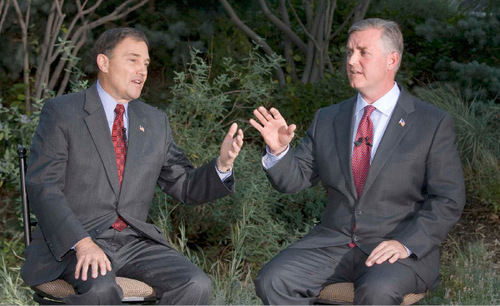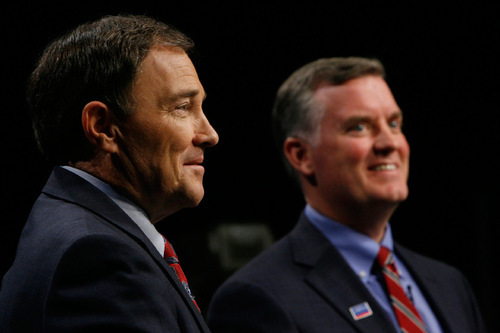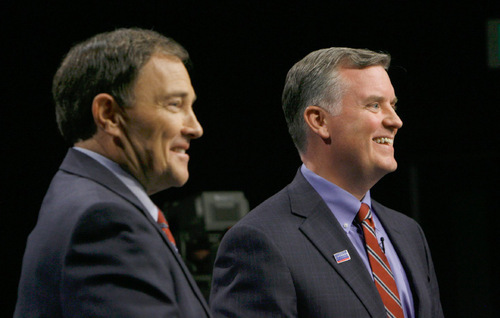This is an archived article that was published on sltrib.com in 2010, and information in the article may be outdated. It is provided only for personal research purposes and may not be reprinted.
Even in tumultuous economic times, money has flowed freely into the governor's race, with Republican Gov. Gary Herbert and Democrat Peter Corroon piling up nearly $5 million in campaign contributions.
And what do those thousands — in some cases tens of thousands — of dollars buy?
Nothing, according to each candidate — at least when it comes to their own donors.
"I think it's obvious why they do it," Herbert said in an interview. "They do it because they believe in the people they're supporting. Why do they give $5? Why do they give $50?"
But Utah's Wild West campaign laws — the state is one of just four that have no limits on who may give or how much they can contribute — have erupted into a Wild West shootout, as Corroon has questioned whether Herbert's big donors have received special treatment from the state.
On Monday, Corroon ratcheted up the attack, unveiling a new campaign ad assailing "Herbert's corrupt system" of rewarding donors and depriving Utah schools.
Herbert's campaign responded, calling the new ad "ludicrous."
"He is continuing his smear based on his complete lack of understanding of the way the state works," said Herbert spokesman Don Olsen. "It's just maddening."
At its core, the clash between Herbert and Corroon comes back to Utah's campaign finance laws. Questions about the free-wheeling system have been lingering for years, and some have said it is ripe for abuse.
In 2008, then-Gov. Jon Huntsman Jr. voluntarily capped donations for his re-election bid at $10,000, saying larger contributions are "ground for mischief," although he accepted contributions as large as $25,000 to his political action committee."
He created a task force, the Governor's Commission on Strengthening Democracy that cited the potential for corruption or at least the appearance of it in unanimously endorsing a $10,000 campaign contribution cap.
Kirk Jowers, director of the University of Utah's Hinckley Institute of Politics and chairman of the governor's commission said he made a case to Herbert and legislators at the time that campaign limits might be in their own best interest.
"I told every legislator who would listen and the governor that passing some sensible campaign finance reform would protect them," Jowers said. "They could act with complete honesty and integrity, but if the timing happens to be that if a big donor gets a contribution then their motive and actions might be impugned."
"It wasn't very persuasive," Jowers said.
The group Utahns for Ethical Government, which is working to get tough legislative ethics rules, including campaign limits, on the 2012 ballot, has challenged Herbert and Corroon to voluntarily limit their contributions to $10,000. Neither has agreed.
David Irvine, a lawyer and former legislator working with UEG, said there are lots of reasons people give to campaigns, especially smaller donations.
But "big big" contributions raise questions, Irvine said. "Clearly there are people who are making contributions because they will expect they will get something in return."
Herbert insists donors have not received special treatment, despite the released e-mail from one of the governor's fundraisers to his scheduler, setting up a meeting with Guy Wadsworth, a large donor, reminding the governor "that Guy was one of the $50,000 donors to the gala."
Herbert said he got the e-mail because he had met Wadsworth at another event and didn't know who he was.
Corroon's insinuation that the Herbert administration offered up special treatment for contractors and businesses has drawn the scorn of some of Corroon's own donors.
An executive from Rocky Mountain Power — which the Corroon camp suggested may have landed a spot on an energy task force as a result of a $15,000 contribution to the Herbert campaign — did not take kindly to the suggestion, and suggested Corroon return a $5,000 check from the company.
"We were concerned about that and troubled by the implication," said Rocky Mountain Power spokesman David Eskelsen. "We asked the Corroon camp if they'd like to return the $5,000 contribution, as they appeared to believe such a contribution might seem objectionable."
Corroon's campaign has not returned the donation. —
Money train
Despite the controversy swirling around campaign contributions, money keeps rolling in. Democrat Peter Corroon's campaign boasted this weekend it has raised more than $2 million for Corroon's gubernatorial bid, putting the Salt Lake County mayor on track to raise more than any past Democratic candidate for governor.
And the Herbert campaign has racked up more than $2.6 million thus far, about half of it from donations exceeding $10,000. The Herbert total is surpassed only by the $4.4 million that former Gov. Jon Huntsman Jr. raised during his first run for office in 2004.







